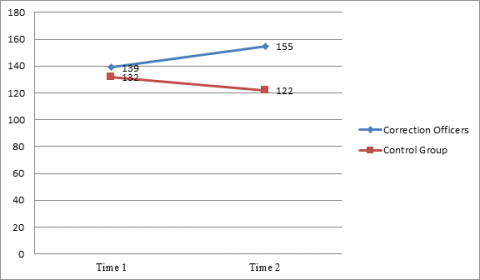Does work stress change personalities?

Does work stress change personalities? Working in prison as a personality-changing factor among correctional officers
By Nina Suliman and Tomer Einat
Studies focusing on prison staff in general and correctional officers in particular reveal a link between the working environment in prison and stress and burnout. These factors are linked to correctional officers’ physical and mental health, rates of absenteeism and intention to quit, and attitudes toward the workplace. It should be noted, however, that existing studies have tended to analyze the impact of the work environment on correctional staff at a given moment and have thereby disregarded the long-term impact of correctional officers’ work on their personalities.
The aim of our research was to explore the impact of employment in prison on correctional officers’ levels of neuroticism. Neuroticism represents the individual’s emotional stability and relates to anxiety, anger, depression, poor control of urges, social embarrassment, and vulnerability. Our main findings indicate that Israeli correctional officers reached a significantly higher score of neuroticism than employees of organizations similar to the Israeli Prison Service after three to four years of employment. Additionally, the analysis revealed that, after three to four years of work, the neuroticism score among employees of organizations similar to the Israeli Prison Service was significantly lower than at the start of their employment.
Figure 1:

We also found a significant increase in the scores for Anger, Depression, Social embarrassment, Poorcontrol of urges, and Vulnerability after four years of service among correctional officers. Simultaneously, we revealed a significant decrease in Anxiety, Anger, Depression, Social embarrassment, and Vulnerability among employees of organizations similar to the Israeli Prison Service.
Table 1: Subsets for the Neuroticism Factor, t-tests for Dependent Samplings in the ResearchGroups
Prison Service | Control Group | |||||
Subset | Before | After | Statistical | Before | After | Statistical |
Anxiety | 24.8 ± 5.0 | 25.9 ± 6.3 | t(119) =-1.618 | 23.6 ± 5.6 | 21.8 ± 6.2 | t(147) = 4.10*** |
Anger | 24.2 ± 6.4 | 28.3 ± 7.1 | t(119) = -5.920*** | 22.4 ± 6.6 | 20.8 ± 6.2 | t(147) = 3.4*** |
Depression | 18.2 ± 5.9 | 20.6 ± 7.0 | t(119) = -3.723*** | 6.2 ± 5.0 | 14.8 ± 4.2 | t(147) = 3.47*** |
Social Embarrassment | 25.0 ± 6.0 | 28.7 ± 6.6 | t(119) = -5.871*** | 24.1 ± 5.9 | 22.5 ± 6.2 | t(147) = 1.76*** |
Poor Control of Impulses | 22.3 ± 6.2 | 24.8 ± 6.9 | t(119) = -3.334*** | 21.3 ± 6.9 | 20.0 ± 6.5 | t(147) = 2.85** |
Vulnerability | 124.3 ± 6.1 | 26.4 ± 6.9 | t(119) = -3.407*** | 24.1 ± 5.7 | 22.1 ± 6.1 | t(147) = 4.44*** |
Note.**p < .01 ***p < .001
We subsequently examined levels of neuroticism among groups of employees with differing seniority at the same point in time. Among correctional officers,officers with four years of service scored significantly higher than new recruits. As regards employees of organizations similar to the Israeli Prison Service, we found that neuroticism among employees with four years of service was significantly lower than among new candidates who had not yet started work.
These findings reveal a significant increase in levels of neuroticism among correctional officers after three to four years in employment, contrasting with a significant decrease in levels of neuroticism among employees within other nationwide public organizations with similar characteristics after the same number of years. Given that most studies in the sphere of personality have indicated a significant decrease in levels of neuroticism among the general population aged between 20 and 30, the findings of the present research are particularly noteworthy.
A possible explanation for the significant increase in levels of neuroticism among correctional officers is the impact of continuing traumatic pressures on personality. In her book Trauma and Recovery, Herman (1992)addressed the concept of complex post-traumatic stress disorder and characterized it as a disorder stemming from exposure to prolonged traumatic situations of stress. She also suggested the possibility of enduring personality change after catastrophic experiences (1992, p. 150). The whole range of experiences and pressures that correctional officers experience frequently, and the need to function under constant threats to security and to get through the working day unharmed, constitute a prolonged situation of crisis that, over time, may trigger a variety of post-traumatic reactions. In other words, the correctional setting creates pressures and demands that lead to feelings of anger, anxiety, depression, social embarrassment, poor control of urges and vulnerability, which wear officers down and affect their successful job adjustment and their ability to cope.
Lazarus (1961) maintained that the development of personality is a process that accompanies individuals throughout their lives and includes adjustment to external and internal demands. Maladjustment to these demands, which stems from the individual’s inability to solve problems deriving from stress, encourages the development of inappropriate defense mechanisms and solutions. In this theoretical context, our findings indicate an inappropriate adjustment to the implicit and explicit demands of their work environment.
The crowdedness of the prison setting, its noises and odors, as well as the frequent emotional encounters with inmates, bring new officers into an unfamiliar, frightening, and threatening reality that requires rapid adjustment and specific modes of action. Nonetheless, they are required to demonstrate restrained yet tough behavior and operate professionally and effectively from their very first day of work. For many correctional officers, this entails a distancing of their immediate emotions and the presentation of a relaxed yet distance and possibly tough exterior. We believe that this emotion work takes its toll on officers’ mental powers and produces changes in their personalities. But the process does not end here: correctional officers’ burnout and the dwindling of their emotional resources, stemming from the exhausting emotional work, lead to the development of a paradoxical situation in which they develop powerful inner negative emotions alongside a confident and distant appearance. These emotions do not necessarily find their expression externally, but rather they build up within officers’ personalities, leading to a reduction in mental resources and creating post-traumatic reactions, such as anxiety, anger, and difficulty in controlling emotions.
Personality changes which are characterized by an increase in neuroticism may have several effects on both the correctional officer and the organization. Concerning officers, intense feelings of stress and greater vulnerability are liable to lead directly or indirectly to adverse health events (see: Brewer, 2011; McCann, 2014). It can therefore be assumed that the increase in neuroticism and the decline in emotional stability that were found in our study are likely to damage the psychological resilience of correctional officers as well as their mental and physical health. Consequently, correctional officers are likely to see the world more negatively, to have more negative feelings and physical symptoms, and to fall ill more frequently.
Concerning the organization, a connection has been found between an increase in neuroticism and emotional fatigue, depersonalization, a low sense of gratification and achievement, work productivity loss, unwillingness to come to work, and absence from work due to illness. Since prisons are responsible for the wellbeing of their employees, chiefly when that well-being is related to working conditions, we believe that prison facilities must acknowledge the connection between correctional officers’ work and the damage to their personality, identify the major factors at play, and make every effort to reduce or eradicate them. We recommend three specific directions for action.
The first comprises the implementation of techniques to help decrease stress and self-regulation. Understanding prison officers' psychological and emotional distresses and their effect on their behavior and adjustment to their work environment should be of paramount concern to correctional services. Correctional services should employ various stress-reducing mechanisms (pressure valves) and treatment interventions for correctional officers in order to reduce or eliminate such pressures. These could include a range of relaxation techniques, conversations with therapists, and respite sport activity. Whatever the chosen means, correctional services should recognize their importance as integral and legitimate aspects of the correctional officer’s job definition and tasks.
Second, given the correlation between the prison work environment and correctional officers' stress and burnout, we recommend that correctional services carry out routine professional instruction and training to help correctional officers respond to the various occupational challenges that they encounter (e.g. the appropriate response to provocations, coping with anger etc.). We believe that such training, combined with granting correctional officers professional discretion and autonomy, will enable them to achieve and implement better professional decisions.
Finally, correctional services should acknowledge the unique role and professional challenges of correctional officers and develop appropriate and accurate selection tests and employment criteria accordingly. Such tests and criteria should include personality assessment with a focus on emotional stability and maturity, a short stay in prison, and simulation of various stressful situations (e.g. physical confrontations, provocations, and open and hidden threats) in order to examine the candidate's approach to such events and their personal tendency.
References
Brewer, G. (2011). Personality and symptoms of psychological ill health among adult male offenders. American Journal of Men’s Health, 5(3), 236-242.
Herman, J.L. (1992). Trauma and recovery: The aftermath of violence. Basic Books, New York, NY.
Lazarus, R.S. (1961). Adjustment and personality. McGraw-Hill, New York, NY.
McCann, S.J.H. (2014). Higher resident neuroticism is specifically associated with elevated state cancer and heart disease mortality rates in the United States. Sage Open, 4(2), 1-15.
Colonel Nina Suliman has Phd in Criminology from Bar Ilan University. She is a specialist in Clinical Psychology and the Head of the Purchasing Department in the Israel Prison Service.
Tomer Einat is a Professor in Criminology at the department of Criminology at Bar-Ilan University, and the Chair of the Israeli Society of Criminology. His main areas of research interest are Penology, Corrections, Intermediate Sanctions and alternatives to Imprisonment, Criminal Fines, Prisons and Prisoners Subculture and Qualitative Methodology.
How to cite this blog post (Harvard style)
Suliman, N., Einat, T., (2018) Does work stress change personalities? Working in prison as a personality-changing factor among correctional officers. Available at: https://www.compen.crim.cam.ac.uk/Blog/blog-pages-full-versions/does-work-stress-change-personalities (Accessed [date]).
